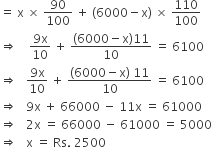 Multiple Choice Questions
Multiple Choice QuestionsA man buys a chair and a table for Rs. 6000. He sells the chair at a loss of 10% and the table at a gain of 10%. He still gains Rs. 100 on the whole. The cost price of the chair is
Rs. 2500
Rs. 2850
Rs. 3050
Rs. 3050
A.
Rs. 2500
Let the C.P. of the chair be Rs. x
∴ C.P. of the table be Rs. (6000 - x)
then,
Total S.P.
A dealer allows his customers a discount of 25% and still gains 25%. If an article costs Rs.1,440 to the dealer; then its marked price is
Rs.1,850
Rs.2,400
Rs.2560
Rs.2560
The difference between a discount of 30% and two successive discounts of 20% and 10% on the marked price of an article is Rs. 144. The marked price of the article is
Rs. 7,200
Rs.7,400
Rs. 7,500
Rs. 7,500
A tradesman marks his goods at 20% above the cost price. He allows his customers a discount of 8% on the marked price. Then his profit per cent is
10.4%
11%
12.2%
12.2%
If a man reduces the selling price of a fan from Rs. 1,250 to Rs. 1,000, his loss increases by 10%. The cost price of the fan is
Rs. 2,400
Rs. 2,450
Rs. 2,500
Rs. 2,500
A man sold an article at a gain of 5%. Had he sold it for Rs. 240 more, he would have gained 8%. The cost price of the article is
Rs. 6,000
Rs. 10,000
Rs. 12,000
Rs. 12,000
The profit obtained by selling an article for Rs. 625 is same as the loss incurred if it is sold for Rs. 545. The price at which it is to be sold to realize a profit of Rs. 65 on the cost price is
Rs.640
Rs. 630
Rs. 650
Rs. 650
Rahul sells a machine for ₹ 50 lakh at a loss. Had he sold it for ₹ 60 lakh, his gain would have 7 times the earlier loss. What is the cost price of the machine?
₹ 51.25 lakh
₹ 58.75 lakh
₹ 67.14 lakh
₹ 43.75 lakh
If a merchant offers a discount of 20% on the list price, then she makes a loss of 16%. What percent profit or percent loss will she make if she sells goods at a discount of 10% of the list price?
14% profit
20% profit
50% profit
5.5% loss
